
The dynamic duo of Growe and Sturdevant has written a truly must-read historical narrative that is also an intimate story of one of our Leagues own. More importantly, theyve captured the essence of Joans life message for us all: change is always possible, but only if we turn outto vote, to learn, to advocateas active participants in our democracy.
Michelle Swarmer Witte, executive director, League of Women Voters Minnesota
Minnesotas iconic former secretary of state, Joan Growe, has written a timely book about her work to promote transparency in government and protect one of our most fundamental freedoms, our sovereign right as citizens to speak and be heardour right to vote. It is an inspiring must-read for anyone who values this right and wishes to learn how best to preserve it.
Paul Anderson, former associate justice, Minnesota Supreme Court
Having served six terms as secretary of state, Joan Growe is a Minnesota treasure. She was first elected when women were just beginning to enter politics, and her stories of challenges and accomplishments will engage and inspire a new generation of leaders. Readers will especially benefit from Growes expertise on election reform and her insights on reducing barriers to voting, reforming election administration, and increasing government accountability.
Kathryn Pearson, associate professor of political science, University of Minnesota
This remarkable book was written for all who love our democracy and who worry about how it is doing, given nonstop assaults from enemiesforeign and domestic. Joan Growe presents a treasure chest of inspiring stories and wisdom-infused warnings. This book, the next chapter in her life of public service, is what you want from a true servant leaderstraight talk and knowledgeable, heartfelt advice.
Mark Ritchie, president, Global Minnesota, Minnesota secretary of state, 200715
The first woman elected to a Minnesota statewide office in her own right, former secretary of state Joan Growe deserves much of the credit for Minnesota leading the nation in voter turnout in the last five presidential electionsand earning the reputation as the state that votes. In this clearly written memoir, Growe makes a persuasive case for why protecting voting rights and boosting political participation matters.
Bill Salisbury, St. Paul Pioneer Press capitol bureau reporter
TURNOUT
Making Minnesota the State That Votes
Joan Anderson Growe
with Lori Sturdevant
Foreword by Hillary Rodham Clinton
Copyright 2020 by Joan Anderson Growe and Lori Sturdevant. Other materials copyright 2020 by the Minnesota Historical Society. All rights reserved. No part of this book may be used or reproduced in any manner whatsoever without written permission except in the case of brief quotations embodied in critical articles and reviews. For information, write to the Minnesota Historical Society Press, 345 Kellogg Blvd. W., St. Paul, MN 551021906.
mnhspress.org
The Minnesota Historical Society Press is a member of the Association of University Presses.
Manufactured in the United States of America
10 9 8 7 6 5 4 3 2 1
 The paper used in this publication meets the minimum requirements of the American National Standard for Information SciencesPermanence for Printed Library Materials, ANSI Z39.481984.
The paper used in this publication meets the minimum requirements of the American National Standard for Information SciencesPermanence for Printed Library Materials, ANSI Z39.481984.
International Standard Book Number
ISBN: 978-1-68134-163-7 (paper)
ISBN: 978-1-68134-164-4 (e-book)
Library of Congress Cataloging-in-Publication Data
Names: Growe, Joan Anderson, author. | Sturdevant, Lori, 1953 author.
Title: Turnout : making Minnesota the state that votes / Joan Anderson Growe ; with Lori Sturdevant.
Description: Saint Paul, MN : Minnesota Historical Society Press, 2020. | Includes bibliographical references and index. | Summary: Joan Anderson Growe, Minnesotas secretary of state from 1975 to 1999 and the architect and chief promoter of Minnesotas high voter turnout, tells her story, showing how hard work and cooperation made the state a leader in clean, open elections.Provided by publisher.
Identifiers: LCCN 2020013679 | ISBN 9781681341637 (paperback) | ISBN 9781681341644 (ebook)
Subjects: LCSH: Voter turnoutMinnesota. | ElectionsMinnesota. | Political participationMinnesota.
Classification: LCC JK6190 .G76 2020 | DDC 324.609776dc23
LC record available at https://lccn.loc.gov/2020013679
This and other Minnesota Historical Society Press books are available from popular e-book vendors.
For Tom and Sydney, Sofia, and Katie
Contents
by Hillary Rodham Clinton
Foreword
N o one could have predicted that the hundredth anniversary of women gaining the right to vote across our country would overlap with a global pandemic that would challenge our democracy, all in a presidential election yearbut here we are, and its hard to think of a more urgent topic in America in 2020 than voting.
The right to vote is the cornerstone of our democracy. It is the muscle of our body politic. It determines whether well have good jobs and growing incomes, an economy that works for everyone, and access to quality, affordable health care. It influences so many facets of our lives, from the schools we attend to the roads we drive on. It powers the change we seek and the future we envision. No matter what issue you care about, the right to vote is central. And the fight to protect that fundamental right is the single greatest fight of our time. Thats why we need a twenty-first-century civil rights movement devoted to claiming, enforcing, and defending the right to vote. Joan Anderson Growe has given us an excellent guide for that workfrom restoring the Voting Rights Act to advocating for vote-by-mail to championing automatic voter registration and implementing laws and policies that lead to cleaner, more transparent elections.
As Joan points out, something is very wrong when millions of American citizens are systematically and deliberately kept from voting. Theres a saying I first heard years ago in Arkansas: If you see a turtle sitting on a fence post, you know it didnt get there on its own. In the pages that follow, Joan traces the antidemocratic history of voter suppression from early voter registration requirements intended to deny the vote to immigrants to literacy tests and poll taxes aimed at disenfranchising African Americans to the shameful gutting of the Voting Rights Act in 2013 to present-day attempts to discourage, depress, and deter people from votingparticularly young people, the elderly, women, and people of color. She addresses the question of electoral security, demonstrating the weakness of arguments about voter fraud. She explores the damaging role of foreign interference in our elections as well as one of the biggest threats we face: the distrust, apathy, and cynicism that keep too many Americans from showing up at election time. In recent years, more people than I can count have asked me the same question: How did we get here? Joans book provides an answer.
Turnout is a powerful and relevant case study in what it takes to build a voting process thats convenient, easy, and suited to the realities of modern life. Its also a memoir of Joans life and trailblazing career in government. In many ways, her rise through the ranks of politics mirrors the history of womens political enfranchisement in America. Joan was born just fifteen years after the Nineteenth Amendment granted women the right to vote (though it would take decades of organizing and legislation like the Voting Rights Act to secure that right for non-white women and, as Joan notes, that struggle continues today). She grew up without knowing of a single woman in any elected office on the local, state, or federal level. She made her first foray into civics through the League of Women Voters, an organization founded to continue what suffragist Carrie Chapman Catt called a mighty political experiment to encourage women to use their newly won electoral power. The womens movement of the 1960s opened Joans eyes to the possibility of changing narrow-minded attitudes about womens worth. Almost unwittingly, she writes, we were becoming feminists. While observing the legislative process at the state capitol, Joan came to the same realization that has inspired a new generation of women, young people, and people of color to step into the arena: I could do better than that.
Next page
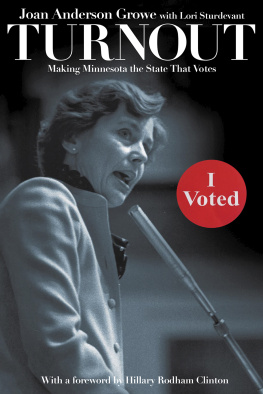
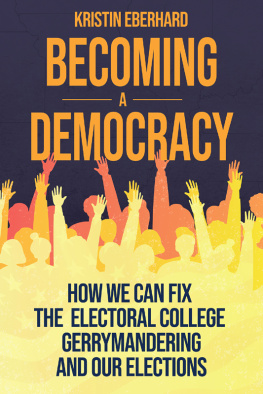
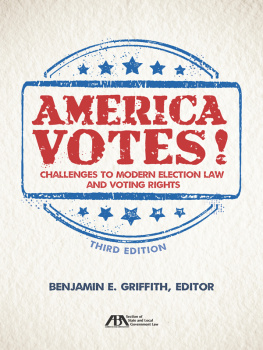
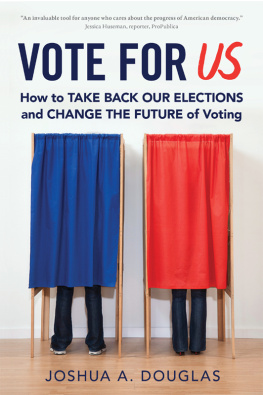
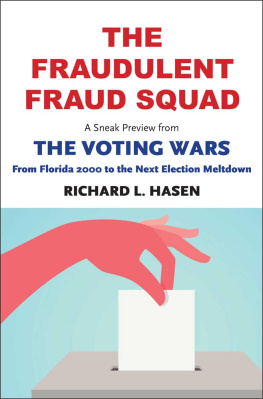

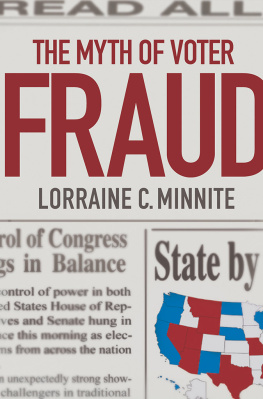
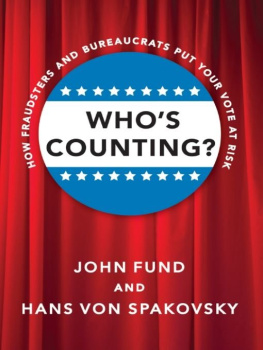
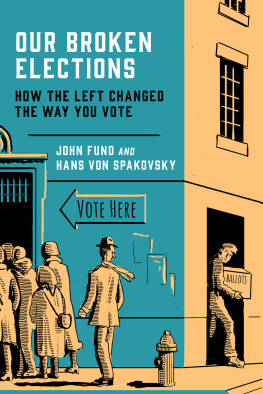
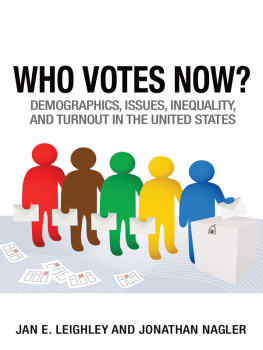
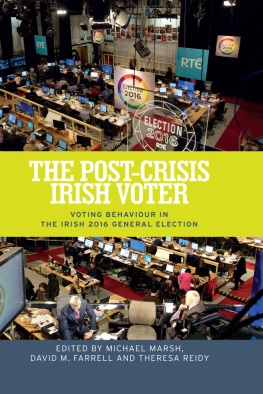




 The paper used in this publication meets the minimum requirements of the American National Standard for Information SciencesPermanence for Printed Library Materials, ANSI Z39.481984.
The paper used in this publication meets the minimum requirements of the American National Standard for Information SciencesPermanence for Printed Library Materials, ANSI Z39.481984.